 Petzlover
Petzlover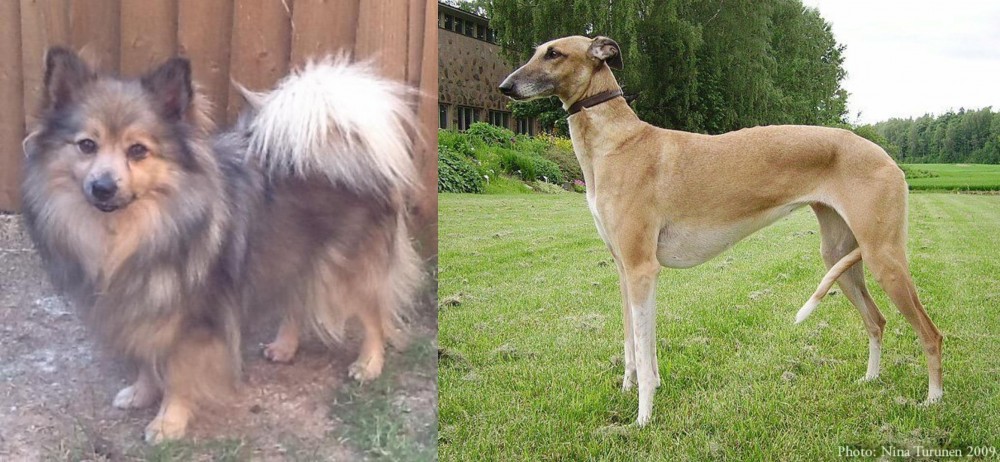 German Spitz (Mittel) is originated from Germany but Hortaya Borzaya is originated from Russia. German Spitz (Mittel) may grow 37 cm / 14 inches shorter than Hortaya Borzaya. German Spitz (Mittel) may weigh 24 kg / 52 pounds lesser than Hortaya Borzaya. Both German Spitz (Mittel) and Hortaya Borzaya has same life span. German Spitz (Mittel) may have less litter size than Hortaya Borzaya. German Spitz (Mittel) requires Moderate Maintenance. But Hortaya Borzaya requires Low Maintenance
German Spitz (Mittel) is originated from Germany but Hortaya Borzaya is originated from Russia. German Spitz (Mittel) may grow 37 cm / 14 inches shorter than Hortaya Borzaya. German Spitz (Mittel) may weigh 24 kg / 52 pounds lesser than Hortaya Borzaya. Both German Spitz (Mittel) and Hortaya Borzaya has same life span. German Spitz (Mittel) may have less litter size than Hortaya Borzaya. German Spitz (Mittel) requires Moderate Maintenance. But Hortaya Borzaya requires Low Maintenance
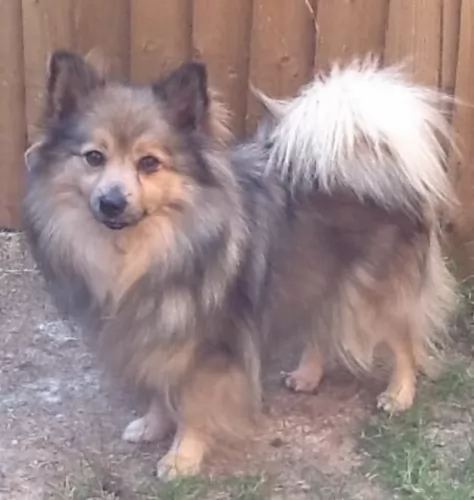 Originating in Germany, the German Spitz Mittel is an alert, vigilant dog and it is these qualities that made him sought after for working on farms.
Originating in Germany, the German Spitz Mittel is an alert, vigilant dog and it is these qualities that made him sought after for working on farms.
He is no new breed and is the 3rd largest of the five German Spitz varieties. It is believed that the German Spitz descended from the Northern sled and herding dogs which arrived with the Vikings into Europe. When you do research you see that the dogs are mentioned in German literature which dates way back to to 1450 already.
 The Hortaya Borzaya is an ancient sighthound from Asia with its origins in Kievan Rus = Grand Duchy of Lithuania = Polish-Lithuanian Commonwealth and the Empire of Russia. The Hortaya is a large dog, especially a long in body dog with a muscular build suitable for running fast. He is one of the most talented of sighthounds, able to track moving prey at quite great distances. He is an intensely active when running prey and quiet and well balanced when not working.
The Hortaya Borzaya is an ancient sighthound from Asia with its origins in Kievan Rus = Grand Duchy of Lithuania = Polish-Lithuanian Commonwealth and the Empire of Russia. The Hortaya is a large dog, especially a long in body dog with a muscular build suitable for running fast. He is one of the most talented of sighthounds, able to track moving prey at quite great distances. He is an intensely active when running prey and quiet and well balanced when not working.
In Asia and Russia, it is still a working hunting dog, hunting a variety of game such as Saiga antelopes, wolves, foxes, and hares. With tremendous endurance, the Hortaya can run at great speeds and great distances on the hunt. The Hortaya Borzaya is a long distance runner rather than a sprinter like the greyhound we are all so familiar with. He also needs very little rest between runs of up to 4 km. The Hortaya uses his sense of smell as well as sight in the hunt. They hunt solo, in pairs or in packs.
It was not until 2004 that the Hortaya was first exported to Europe and given full breeding papers. They went to Germany, Slovakia and the Czech Republic in 2004. They went to Switzerland and Finland in 2005 and to the United States around 2005. Prior to this the Hortaya Borzaya was bred only in its original territory for thousands of years.
Unlike Western breeding programs, the Hortaya is not bred for the purpose of improving the breed. Like Asian thoroughbred horses the breed is considered “finished”. Because of this there was no inbreeding, linebreeding or incest. This is true for about 4-6 generations of a line. This helps the breed to stay healthy.
The breed was developed centuries ago being bred by many different groups of people throughout the region, making it impossible to say exactly where and how this Central Asian/Afghanistan/ southern Russian breed developed. The Russian Kynological Federation (RKF) member of the FCI, developed a standard for the Hortaya Borzaya, which unlike most breed standards, does not tell you what the Hortaya must be like. Instead it tells you what he cannot be.
It gives boundaries that the dog must fit inside in order to be considered a Hortaya Borzaya. This is because the breeds of these dogs in their native territories want to preserve as many different types and sub-types as possible under the banner of one breed. To most people these dogs would look like very different breeds. For this reason, they have not been accepted into International Breed Groups and Associations. The breeders of these dogs do not want to be tied down to one standard. They do not want the breed to be separated into western lines and the original line or show lines and working lines. They wish to keep all the dogs within one grouping.
The breed is recognized on the national level by the originating countries and federations, including Russia’s. There are an estimated 2500-3500 dog of this breed in existence to day. Only a few dozen of the breed exist outside of the original countries. In other Eastern and European countries, the dogs may be registered with hunting associations instead of a breed association.
The breed is held mostly by hunters in remote, local areas and villages that are fairly isolated. Here the Hortaya is seen as a partner in feeding the hunters family and the dog is invaluable. In these remote areas a good hunting dog is equal in value to the good horse. Both are essential to the hunter and his family’s livelihood.
The Hortaya Borzaya is a pack dog and does well with the family as well as an athletic hunter. They hunt in packs, small groups or alone and bring their catch back to the hunter for the family meal. No hunter had to go with the dog. In fact, the hunters would send the dogs several times for food. The Hortaya might travel for miles across tough terrain to get food for the family.
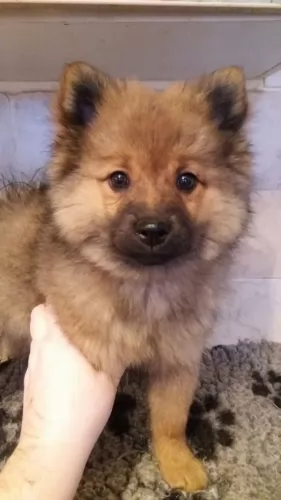 The German Spitz Mittel is similar in looks to the other sizes of German Spitz. The Mittel is a medium sized dog and stands between 30 and 38cm in height and weighs between 7 and 11kg. You’ll find him in solid colors such as tan, liver, white, fawn, black or a mix of these colors.
The German Spitz Mittel is similar in looks to the other sizes of German Spitz. The Mittel is a medium sized dog and stands between 30 and 38cm in height and weighs between 7 and 11kg. You’ll find him in solid colors such as tan, liver, white, fawn, black or a mix of these colors.
He has a soft woolly undercoat and a long outercoat with a mane-like ruff at the neck. He has a fairly long muzzle, dark eyes, sharp erect ears and a bushy tail which curls over his back.
Affectionate, faithful, and always happy by nature, the German Spitz Mittel is a family companion that wants to be part of everything his human family is up to. He makes a good watchdog. He is alert and has a distrust of strangers.
He gets on well with children in the home and he can also live in peace with other dogs. Because he is an intelligent dog, you won’t have much trouble with training- and socializing him, although he will require a firm, consistent owner and trainer.
Training and socialization are important as there are always some important commands such as sit, stay, come and lie down that you will want him to respond to immediately.
 This athletic sighthound is a handsome dog, ranging from large to giant. Remember there are many different ‘types’ of dogs within the one line/breed of Hortaya. Breed standards are exclusionary, and performance based rather than inclusionary, and appearance based. Still most of the breed lines share many of the same traits.
This athletic sighthound is a handsome dog, ranging from large to giant. Remember there are many different ‘types’ of dogs within the one line/breed of Hortaya. Breed standards are exclusionary, and performance based rather than inclusionary, and appearance based. Still most of the breed lines share many of the same traits.
They are a long legged breed with a very deep chest and flexible spine. They have immensely strong lungs and a narrow but long skull. Their gait is fluid, effortless trotting when not hunting. When she is hunting, they gallop like a horse and cover a lot of ground.
There eyes are usually black but can be any color and their fur is also any color. It is thick and dense. Finally, in the 2000’s, there were some dogs in a subline exported to Europe and to North America. Here, for this subgroup, a standard was established based on appearance and the color or the coat was now set at only white, blue, black, cream, red, sable and brindle, and piebald. They might or might not have a saddle. Definition of this type is still going on and has not been entirely settled yet. This standard is only for the European and American market show dogs.
These dogs, bred for show, have the same ability to run like the wind and for a very long time with his muscled body and long legs. The breed has strength and stamina that will fool you. He also has a long neck and broad back. He has thin, short ears.
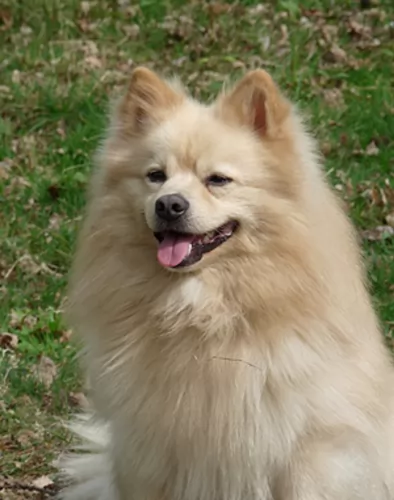 People who have owned a German Spitz Mittel are delighted with him, saying that he is such an easy-going, happy dog. He is social and thrives on the interaction he has with his human family.
People who have owned a German Spitz Mittel are delighted with him, saying that he is such an easy-going, happy dog. He is social and thrives on the interaction he has with his human family.
He won’t do well if you simply put him in your backyard and forget about him, using him merely as a watchdog.
The German Spitz Mittel dog is one dog that definitely lives up to the title of man’s best friend. He is social, happy, loving, loyal, playful, entertaining and smart too, and when you treat him the way he deserves, you’ve got the most awesome friend.
 Children friendliness - yes, they are very good with children and will play with them for hours.
Children friendliness - yes, they are very good with children and will play with them for hours.
They have tremendous stamina, speed and intelligence to hunt on their own without the hunter and bring the prey back in good shape for the hunter’s family to eat.
No they are not very adaptable in terms of living arrangements. They will not do well in an apartment and probably not in the city as they need land to run.
Learning ability yes, they are intelligent and learn easily.
 German Spitz dogs are healthy, and when you shower him with love and attention and good food, you can expect to have him around for up to 15 years of age.
German Spitz dogs are healthy, and when you shower him with love and attention and good food, you can expect to have him around for up to 15 years of age.
Of course, as with any other healthy dog breeds, there are always one or two common dog illnesses that your dog may get. These include hip dysplasia and eye diseases. If you notice symptoms that indicate possible joint issues with your pet, get him to the vet immediately.
Patellar Luxation for instance occurs when your dog’s kneecap is dislocated. It is more common in toy breeds like the German Spitz. It can be painful for your pet and lead to lameness. If your dog has problems with his hip, it can actually force the patella out of its groove, which is a secondary condition.
 As previously mentioned, the original breed is isolated and therefore has a pretty good health track record. Most of the breed specific illnesses or conditions that usually are inherited barely exist in this breed.
As previously mentioned, the original breed is isolated and therefore has a pretty good health track record. Most of the breed specific illnesses or conditions that usually are inherited barely exist in this breed.
They have a propensity toward obesity and diet is essential to prevent other issues.
Chronic or acute pancreatitis is possible because the breed developed eating small meals and hardly any meat. Too much meat or fat could cause this.
No tolerance for high protein dog food. Can cause puppies to have life threatening damage to bones and cartilage that is irreversible.
Bloat – because of the deep chest and the intolerance for large meals they are prone to bloat.
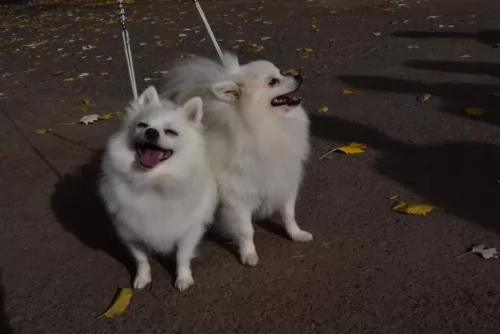 You can help reduce loose hairs with your German Spitz by brushing his thick coat twice a week. It’s a good time to also inspect your dog for ticks and fleas.
You can help reduce loose hairs with your German Spitz by brushing his thick coat twice a week. It’s a good time to also inspect your dog for ticks and fleas.
Your German Spitz Mittel isn’t the most active dog, but he will still need regular exercise. Going on a walk is good for both you and him. He is a mentally sharp dog too and these walks keep him both physically- and mentally fit. He also loves ball games.
Every dog deserves the best food, and if you feed your German Spitz Mittel with a commercially manufactured dog food, make sure its one of the top quality ones. You want to avoid foods packed with preservatives, colorants and fillers. You want dog foods with minerals and vitamins with high protein and ingredients such as Omega 3 and 6 to promote health skin.
There are also some dog foods which have ingredients in them such as polyphosphates. Ingredients like this keep your dog’s teeth clean.
Try and also give him some cooked rice, vegetables and chicken mixed into his kibble from time to time as well as raw meat. He should never be without fresh, cool water.
 As mentioned above do not overfeed a Hortaya Borzaya puppy. There is serious risk of irreversible damage if you do. Feed small meals 3-6 times a day with lower protein.
As mentioned above do not overfeed a Hortaya Borzaya puppy. There is serious risk of irreversible damage if you do. Feed small meals 3-6 times a day with lower protein.
3 cups of an average protein high quality dog food served at least 3-4 times per day. To avoid bloat do not feed large meals before or after exercise and don’t let your dog drink a lot of water at one time.
This is an extremely active dog bred to hunt 5-6 times a day over wide expanses of various and rough terrain. They need exercise. If you run, they will run with you happily and they will outlast you. They are good at and enjoy fetch, chase, agility, and field trials. They will last hours at any game they play.